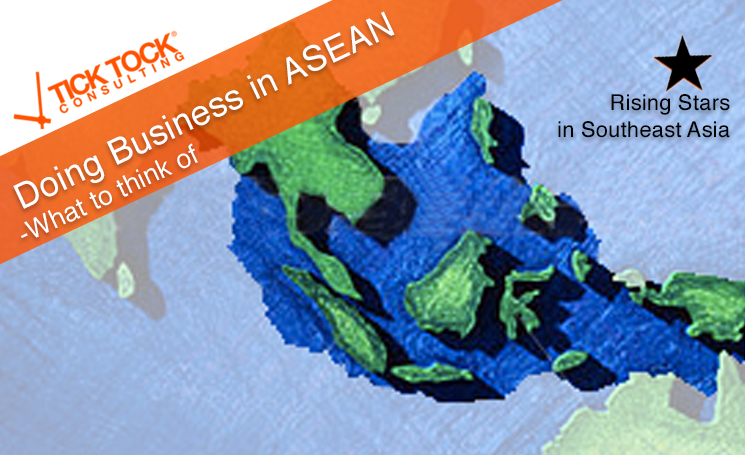As one of the strongest economic communities in the world, ASEAN offers huge opportunity with potential customers of more than 620 million and the AEC that increase the region’s integration into the global economy. However these benefits are not yet evident in all AEC countries, international companies have to be prepared of unexpected challenges during their business expansion ASEAN. To capture the business opportunities that are described in the Rising Stars in Southeast Asia, one should be aware of potential challenges, that if they are managed well, can become opportunities for a rapid ROI.
Regulations and official procedures
The regulatory environment is often immature in terms of adherence to international standards and procedures. This often complicates official procedures and equally makes it complicated for the regulators and policy makers to keep up with the speed of development.
To mention a two examples:
- Banking and financing system is a highly regulated sector and it remain closed to international banks and also within ASEAN/AEC. Regulators have challenges to regulate and keep up with the players in the market, closing loopholes and increase transparency in the system. The stability and maturity of the financial system, the liquidity and financing solutions available is often far from international standards.
- Healthcare sector is another sector that is highly regulated with limited standardisation and an equal challenge for the regulators to keep up with the risks of fals and contaminated medicine, making the registration processes very complicated. The regulations and procedures are different in all AEC countries and there are no standardised definitions or terminology available. We recently experienced this with one of our clients when registering their products in Indonesia, Vietnam and Thailand. Each country categorise the products differently and require very different information for the products to be registered.
Heterogeneous region
There are large differences between the countries in ASEAN. From some of the poorer countries in the world, Lao PDR and Cambodia, both with fairly small populations, to Indonesia a G20 member and one of the largest countries in the world (by population) and the City-State Singapore with a small population and the highest income per capita in ASEAN and higher than many developed countries.
The political climate is very different in ASEAN, just to mention a few:
- In Myanmar the military junta has ruled the country since 1962 and started democratising the country in 2010/11 and the election in 2015 was won by the opposition National League for Democracy and the leader Aung San Suu Kyi got enough votes to form a government.
- Vietnam ”The Socialist Republic of Vietnam” is defined by a single-party socialist republic framework.
- In Singapore politics have been dominated by the People’s Action Party (PAP) since the 1959 general election.
- Thailand was a constitutional monarchy. until the coup the 22 of May 2014, when the 2007 constitution was revoked. Since then Thailand has been under the rule of a military organisation called National Council for Peace and Order (NCPO), which has taken control of the national administration.
International companies should be aware of these and many other differences between the ASEAN/AEC countries. The survey/ranking on ”Ease of doing business” in the region is not enough to represent the overall country condition. For instance Singapore should be compared with Kuala Lumpur, Jakarta and Bangkok, but it may not be a valid measurement for second or third tier cities.
In addition, how international companies do business in respective countries are different. Some countries are more centralised while other countries are more decentralised. In Indonesia, international companies who got a permit from central government still have to apply for permit from regional government. What we have experienced from working with State Owned Enterprises (SOE), head office approval and regional office approval are two separate things. Thus, international companies have to do thorough stakeholder management, knowing who are the influencers and decision makers, to make the business transaction to run smoothly.
Corporate Governance & Public reporting
Singapore, Malaysia and Thailand are the top three ASEAN/AEC countries that emphasise the importance international corporate governance standards. When the international companies decided to invest or partner up with local companies, thorough due diligence is highly recommended. Even though many local companies may be registered as listed companies, only few adhere to international corporate governance standards and public reporting. Therefore it is harder for foreign companies to understand local companies’ condition and performance in market. Public information can be misleading and not show the full picture.
National budget priority
Diverse economic achievements and more or less dependancy on international development banks and donors to the national budget makes the prioritisation and allocation process complicated. For example healthcare sector in Indonesia is 3.1% in comparison with Cambodia’s 7.5% of, education sector in the Philippines’ is 3.4% and 7.6% in Thailand. How the nation prioritise their budget allocation will impact the development of the sector from infrastructure, equipment and technology to availability of a skilled workforce.
Understanding these priorities and how they will impact the development of the sector will have an impact on the short-term and certainly the long-term ROI.
Rising Stars in Southeast Asia – Business Opportunity Analysis

